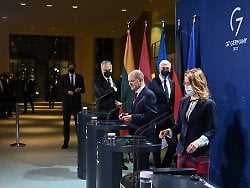Meeting with Baltic States
Scholz leaves Estonia in the dark about arms exports
2/11/2022 1:37 am
The three Baltic EU states of Estonia, Lithuania and Latvia are looking for Germany’s support in view of the Russian troop deployment. Chancellor Scholz assures them of solidarity at a meeting of heads of state. However, he does not mention the name Nord Stream 2. Lithuania’s president would have hoped for more.
The federal government continues to leave Estonia in the dark as to whether it will be allowed to deliver nine artillery pieces from GDR stocks to the Ukraine. Estonian Prime Minister Kaja Kallas said Thursday evening after a meeting with Chancellor Olaf Scholz in Berlin that there was still no official answer to her defense ministry’s request. In an interview with the German Press Agency together with “Politico”, she expressed skepticism about her chances of success. “If you look at their public opinion, it looks more like it’s going to be a no.”
The Bundeswehr first delivered the nine howitzers to Finland and then from there to Estonia. It is contractually regulated that Germany must agree to a transfer. The guns, which weigh more than three tons and have a barrel almost five meters long, were developed in the Soviet Union in the 1950s. They can hit enemy troops or tanks at a distance of up to about 15 kilometers.
The approval process has become a symbol for those who criticize Germany’s no to arms sales to Ukraine. The federal government refuses to deliver lethal weapons to Ukraine because it does not want to deliver weapons to crisis areas. The application has been under review since the end of December. Kallas was surprised at how heatedly it was discussed. “We’re a little uncomfortable being at the center of this discussion,” she said.
Scholz met the leaders of all three Baltic states for dinner on Thursday, including Lithuania’s President Gitanas Nauseda and the Latvian Prime Minister Krišjānis Kariņš. Before the meeting, he assured them of Germany’s support. The Baltic States are directly affected by Russia’s worrying military activities, said Scholz. The common position is clear: “We are united and determined.” In the middle of the Ukraine crisis, Russia and Belarus began joint military maneuvers on Thursday.
No word on Nord Stream 2
“We take the concerns of our allies very seriously,” said Scholz. The message is: “We stand by your side. That’s very important to me.” The three Baltic states also border Russia, Latvia and Lithuania with Russia’s ally Belarus. Scholz travels to Moscow and Kiev next week.
The Ukraine crisis was already the main topic during the Chancellor’s inaugural visit to the USA on Monday. US President Joe Biden made it very clear that a Russian invasion of Ukraine would mean the end of the Nord Stream 2 gas pipeline. Scholz, on the other hand, still did not name Nord Stream 2 as a sanction option. However, he emphasized that all options are on the table. The pipeline was also an issue in the Chancellor’s talks with the Balts. When asked if Scholz at least called the project by name behind closed doors, Kallas said: “We understood what we were talking about, but I can’t say if he mentioned the word.” The Baltic states reject the pipeline as a security risk for Europe. “Connections always have two sides. If one side is connected to an opponent, then this side can also hurt you,” said the Estonian Prime Minister.
Even before the talks with Scholz, Lithuania’s President Nauseda had expressed his disappointment at Germany’s negative attitude towards arms deliveries. In a “Welt” television interview, he said: “To be honest, we expected more, but of course we understand the reasons.”
